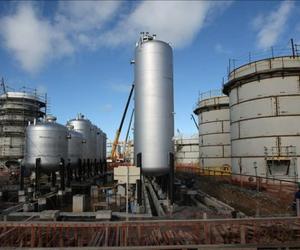Amid uncertainties, Cuba seeks funding for refinery expansion
- Submitted by: lena campos
- Business and Economy
- 02 / 13 / 2013

Cuba is looking for someone to finance a $6 billion expansion of its largest refinery, in the city of Cienfuegos, amid uncertainties about China's role in the project and the future of its close ally and oil supplier Venezuelan President Hugo Chavez.
Ricardo Caballero, chief executive of Cubvenpetrol, a Cuba-Venezuela joint venture running the refinery, said this week the finishing touches are being put on a proposal to present to possible international financiers, but there was "no predetermination" of who would foot the bill and there had been no talks with anyone about it.
"In this moment, we are just now finishing the stage of definition of the refinery. You can't talk with anyone about financing until you finish defining the project," he told reporters at the refinery.
The plan calls for expanding capacity from 65,000 barrels per day to 150,000 and building a liquefied natural gas plant. Once funding is obtained, it will take 45 months to complete the project, said Caballero, a veteran of Cuba's oil industry.
People involved in the expansion said more than two years ago China would build and finance the project, with the money backed by Venezuelan oil. But the deal has never taken wings.
Nothing has been disclosed publicly and the Chinese have been mostly silent on the matter. However, sources say China has never signed a final agreement due to questions ranging from Chavez' health to future oil and natural gas supplies to whether the project will be built by Chinese or Cuban workers.
China signed a letter of intent for the project in 2011, but Caballero said the Chinese are only serving as principal contractors to develop, along with the Italian unit of French company Technip, basic engineering for the expansion.
"They accompanied us during everything. They are still with us during this final stage," he said.
BUILT BY SOVIET UNION
The refinery, its silvered towers rising up from scrublands along Cienfuegos Bay, was completed in 1990 by the Soviet Union when it was Cuba's top ally.
At the same time, the Soviets built a pipeline from Matanzas on the northern coast down to Cienfuegos in the south to transport oil from its supertankers to the plant.
The Soviet Union collapsed in 1991 and with it went Cuba's oil supply. The Cubans used the refinery sparingly because they could only intermittently get oil from other sources and after 1995, they shut it down.
The pipeline from Matanzas was used only once, in a 1991 test, Caballero said. Since then, it has been filled with water and preserving liquid, and there are no plans to use it again. Oil for the refinery comes in via tankers from Venezuela.
The refinery did not reopen until 2007, after Chavez, who is now Cuba's closest ally, funded a refurbishment of the facility and guaranteed a steady supply of oil.
Venezuela sends 115,000 barrels a day to Cuba on highly favorable terms that include a barter arrangement for the services of more than 40,000 Cuban professionals, most of them doctors and other medical personnel.
Chavez, 58, is recovering in Havana two months after his fourth surgery for cancer, described only as being in the pelvic region. He has not been seen or heard from publicly since the six-hour operation on Dec. 11.
Although Venezuelan officials say Chavez is improving, there are doubts about his future, and, consequently, about the future flow of Venezuelan oil to Cuba.
Caballero downplayed the possibility of a change in Venezuela's oil policy, expressed confidence in Chavez' recovery and said all oil for the refinery will continue to come from Venezuela, even if the expansion becomes a reality.
That could change if Cuba realizes its hopes of finding large oil deposits off its northwestern coast, where it says 20 billion barrels of oil may be waiting.
So far, four wells have been drilled in Cuban waters, three of them last year, with all coming up empty. Russia's Zarubezhneft is currently drilling another.
"Undoubtedly if oil appears (there), many doors are going to open," Caballero said.
If Cuba cannot get financing for the full project, he said the plan would be to expand gradually.
In the meantime, tests are underway to see if the refinery can run at up to 80,000 barrels per day, which Caballero said was possible because the Soviets "over designed" projects.
Despite the uncertainties, Cienfuegos officials showed reporters a 1,500-unit apartment project going up to house an expected 5,000 workers to build the expansion.
If the refinery plans do not come to fruition, they said the apartments could be used by favored Cubans, such as star athletes and doctors.
Source: Reuters.com
Comments